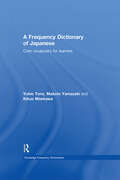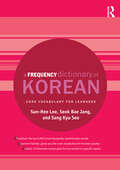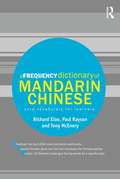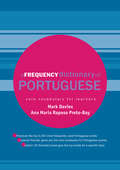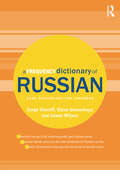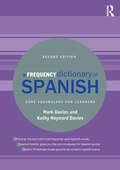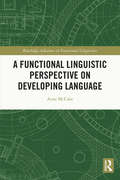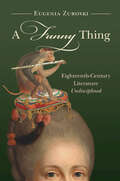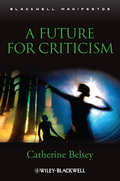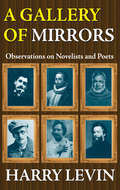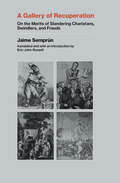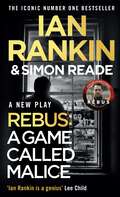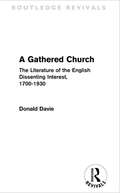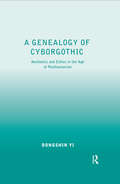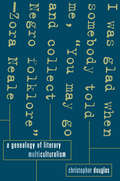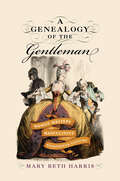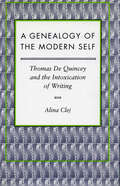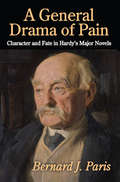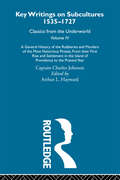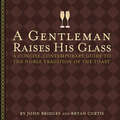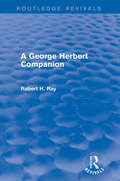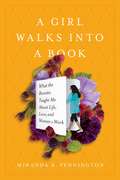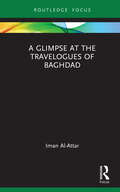- Table View
- List View
A Frequency Dictionary of Japanese (Routledge Frequency Dictionaries)
by Yukio Tono Makoto Yamazaki Kikuo MaekawaA Frequency Dictionary of Japanese is an invaluable tool for all learners of Japanese, providing a list of the 5,000 most commonly used words in the language. Based on a100 million word corpus, composed of spoken, fiction, non-fiction and news texts in current use, the dictionary provides the user with a detailed frequency-based list, as well as alphabetical and part-of-speech indices. All entries in the frequency list feature the English equivalent and a sample sentence with English translation. The dictionary also contains 25 thematically organised lists of frequently used words on a variety of topics such as food, weather, occupations and leisure. Numerous bar charts are also included to highlight the phonetic and spelling variants across register. A Frequency Dictionary of Japanese enables students of all levels to maximise their study of Japanese vocabulary in an efficient and engaging way. It is also an excellent resource for teachers of the language.
A Frequency Dictionary of Korean: Core Vocabulary for Learners (Routledge Frequency Dictionaries)
by Sun-Hee Lee Seok Bae Jang Sang Kyu SeoA Frequency Dictionary of Korean is an invaluable tool for all learners of Korean, providing a list of the 5000 most frequently used words in the language. Based on the Sejong National Corpora, the largest written and spoken corpora in Korean comprised of 10 million words collected from different genres, the Dictionary provides the user with detailed information for each of the entries, including illustrative examples and English translations. The Dictionary provides a rich resource for language teaching and curriculum design, while a separate CD version provides the full text in a tab-delimited format ideally suited for use by corpus and computational linguists. With entries arranged both by frequency and alphabetically, A Frequency Dictionary of Korean enables students of all levels to get the most out of their study of vocabulary in an engaging and efficient way.
A Frequency Dictionary of Mandarin Chinese: Core Vocabulary for Learners (Routledge Frequency Dictionaries)
by Richard Xiao Paul Rayson Tony McEneryA Frequency Dictionary of Mandarin Chinese is an invaluable tool for all learners of Mandarin Chinese, providing a list of the 5,000 words and the 2,000 Chinese characters (simplified) most commonly used in the language. Based on a fifty-million-word corpus composed of spoken, fiction, non-fiction and news texts in current use, the dictionary provides the user with a detailed frequency-based list, as well as alphabetical and part-of-speech indexes. All entries in the frequency list feature the English equivalent and a sample sentence with English translation. The Dictionary also contains thirty thematically organized lists of frequently used words on a variety of topics such as food, weather, travel and time expressions. A Frequency Dictionary of Mandarin Chinese enables students of all levels to maximize their study of Mandarin vocabulary in an efficient and engaging way. It is also an excellent resource for teachers of the language. A CD version is available to purchase separately. Designed for use by corpus and computational linguists it provides the full text in a format that researchers can process and turn into suitable lists for their own research work.
A Frequency Dictionary of Portuguese (Routledge Frequency Dictionaries)
by Mark Davies Ana Maria Preto-BayAn invaluable tool for learners of Portuguese, this Frequency Dictionary provides a list of the 5000 most commonly used words in the language. Based on a twenty-million-word collection of Portuguese (taken from both Portuguese and Brazilian sources), which includes both written and spoken material, this dictionary provides detailed information for each of the 5000 entries, including the English equivalent, a sample sentence, and an indication of register and dialect variation. Users can access the top 5000 words either through the main frequency listing or through an alphabetical index. Throughout the frequency listing there are also thrity thematically-organized ‘boxed’ lists of the top words from a variety of key topics such as sports, weather, clothing and relations. An engaging and highly useful resource, A Frequency Dictionary of Portuguese will enable students of all levels to get the most out of their study of Portuguese vocabulary. Former CD content is now available to access at www.routledge.com/9780415419970 as support material. Designed for use by corpus and computational linguists it provides the full text in a format that researchers can process and turn into suitable lists for their own research work.
A Frequency Dictionary of Russian: core vocabulary for learners (Routledge Frequency Dictionaries)
by James Wilson Serge Sharoff Elena UmanskayaA Frequency Dictionary of Russian is an invaluable tool for all learners of Russian, providing a list of the 5,000 most frequently used words in the language and the 300 most frequent multiword constructions. The dictionary is based on data from a 150-million-word internet corpus taken from more than 75,000 webpages and covering a range of text types from news and journalistic articles, research papers, administrative texts and fiction. All entries in the rank frequency list feature the English equivalent, a sample sentence with English translation, a part of speech indication, indication of stress for polysyllabic words and information on inflection for irregular forms. The dictionary also contains twenty-six thematically organised and frequency-ranked lists of words on a variety of topics, such as food and drink, travel, and sports and leisure. A Frequency Dictionary of Russian enables students of all levels to get the most out of their study of vocabulary in an engaging and efficient way. It is also a rich resource for language teaching, research, curriculum design, and materials development. A CD version is available to purchase separately. Designed for use by corpus and computational linguists it provides the full text in a format that researchers can process and turn into suitable lists for their own research purposes.
A Frequency Dictionary of Spanish: Core Vocabulary for Learners (Routledge Frequency Dictionaries Ser.)
by Mark Davies Kathy Hayward DaviesA Frequency Dictionary of Spanish has been fully revised and updated, including over 500 new entries, making it an invaluable resource for students of Spanish. Based on a new web-based corpus containing more than 2 billion words collected from 21 Spanish-speaking countries, the second edition of A Frequency Dictionary of Spanish provides the most expansive and up-to-date guidelines on Spanish vocabulary. Each entry is accompanied with an illustrative example and full English translation. The Dictionary provides a rich resource for language teaching and curriculum design, while a separate CD version provides the full text in a tab-delimited format ideally suited for use by corpus and computational linguistics. With entries arranged both by frequency and alphabetically, A Frequency Dictionary of Spanish enables students of all levels to get the most out of their study of vocabulary in an engaging and efficient way.
A Functional Linguistic Perspective on Developing Language (Routledge Advances in Functional Linguistics)
by Anne McCabeThis volume offers a comprehensive account of language development from a Systemic Functional Linguistic (SFL) perspective, integrating theory and data from a wide range of research studies. The book begins by taking an in-depth look at SFL theory and its focus on texts, highlighting the metafunctional nature of language and the ways in which individuals’ repertoires of meaning-making resources develop as they interact with the world and with others. Grounded in an SFL approach, the successive chapters consider in turn the key stages of language development, from infancy to school settings to additional, second, and foreign language learning contexts. Each chapter incorporates a range of SFL studies to demonstrate shifts in language development across these stages, but also the discussion of other functional perspectives to examine the ways in which these different approaches inform one another. A concluding chapter considers the implications of these studies for future research as well as for pedagogical practices in literacy teaching. In its consideration of the relationship between SFL theory and its application to language development, this book will be key reading for students and scholars in Systemic Functional Linguistics, language and education, and literacy studies.
A Funny Thing: Eighteenth-Century Literature Undisciplined
by Eugenia ZuroskiEighteenth-century literature is weirder than we realize. A Funny Thing invites readers to be taken by its oddities, its silliness, and its absurdities – both because reading this way is fun, and because this challenges colonialism's disciplinary epistemes of propriety that have consistently bound liberal selfhood to extractive capitalism. Focusing on three aesthetic modes largely unnamed in existing studies of the period's literature – the anamorphic, the ludic, and the orificial – this book offers fresh readings of work by Haywood, Walpole, Bentley, and Burney that point to unexpected legacies from the so-called Age of Reason. This book is for any reader curious about the wilder flights of fancy in eighteenth-century fiction, the period's queer sense of humour, and how writing and art of the time challenge colonial reality. This title is part of the Flip it Open Programme and may also be available Open Access. Check our website Cambridge Core for details.
A Future for Criticism (Wiley-blackwell Manifestos Ser. #40)
by Catherine BelseyA Future for Criticism considers why fiction gives so much pleasure, and the neglect of this issue in contemporary criticism. Offers a brief, lively, and accessible account of a new direction for critical practice, from one of Britain's most prominent literary theorists and critics Proposes a new path for future criticism, more open to reflecting on the pleasures of fiction Written in a clear, jargon-free style, and illustrated throughout with numerous examples
A Gallery of Mirrors: Observations on Novelists and Poets
by T. TregearThe essays in this classic volume range from broad concerns with critical theory and aesthetic formulation to specific analysis of forms and texts. Levin discusses such matters as the symbolic interpretation of literature, the development of literary criticism during the past half-century, European attitudes toward contemporary American writers, and re-evaluations of Joyce, Proust, Balzac, Cervantes, Melville, and Hemingway. Because Levin is both a learned scholar and imaginative critic, there is no comparable book that offers the wit, taste, and learning one finds in these pages. His historical and comparative approaches to literary theory enable Levin to place a given work precisely by relating it to other works and manifestations of culture. World literature is not the province of this work. But Levin views it as the horizon against which our own traditions may be measured. Just as anthropologists discover similar processes working through diverse cultures, so through can we glean understanding of common patterns through the analysis of world literature, our own peculiarly specialized branch of the science of man. The effect of convention, in shaping the extent to which literature may be conceived as an institution, has been widely discussed. A Gallery of Mirrors raises theoretical questions that touch the methodology of humanistic scholarship, with regard to other disciplines, and the status of art, with regard to other modes of knowledge. With changing schools of critical thought, Levin relies considerably on semantics as a precision instrument for defining concepts in the terms of those for whom they were most meaningful.
A Gallery of Recuperation: On the Merits of Slandering Charlatans, Swindlers, and Frauds
by Jaime SemprunThe first English translation of the French cult classic that lampoons France&’s most popular intellectuals of the post-1968 period and their ideas, which became forces of counterrevolution.Eric-John Russell&’s translation of Jaime Semprún&’s brutal takedown of France&’s best-known intellectuals of the post-1968 period, A Gallery of Recuperation, is one of the first full English versions of any of Semprún&’s books. Originally titled Précis de recuperation, the book is a scathing critique of ten major thinkers, including Michel Foucault, Gilles Deleuze, Jean-François Lyotard, and Cornelius Castoriadis. Semprún uses this catalog of careerism to reflect on the concept of recuperation—capitalism&’s uncanny ability to coopt anticapitalist critiques and subvert subversion. His central question: What happens to revolutionary ideas, including Marxism itself, in the hands of professional intellectuals?Semprún&’s idiosyncratic and playful style of polemics takes existentialism, humanism, structuralism, poststructuralism, postmodernism, aesthetics, and psychoanalysis to task, casting new light on the figures who have become dominant staples of modern Anglophone academia, and proving the necessity of critiquing intellectuals&’ roles within contemporary capitalism. A cult classic among the French radical left and scholars of the Situationist International and May 1968, A Gallery of Recuperation never made the impact it should have. Russell&’s translation marks a major step in recognizing Semprún&’s work beyond its French context.
A Game Called Malice: A Rebus Play
by Ian Rankin Simon ReadeA delicious, and somewhat drunken, dinner party segues into a murder mystery game created by the hostess. However, the parlour game may hold clues about the dark truths hiding just under the surface of this genteel gathering...As suspects, clues and red herrings are sifted - it seems one of the guests has an unfair advantage: John Rebus, an ex-detective who used to do this for a living. But is he playing another game, one to which only he knows the rules, that will soon be revealed? As the tension rises, one by one, all their secrets will come out - and there is a shocking discovery that awaits them all...
A Game Called Malice: A Rebus Play
by Ian Rankin Simon ReadeA delicious, and somewhat drunken, dinner party segues into a murder mystery game created by the hostess. However, the parlour game may hold clues about the dark truths hiding just under the surface of this genteel gathering...As suspects, clues and red herrings are sifted - it seems one of the guests has an unfair advantage: John Rebus, an ex-detective who used to do this for a living. But is he playing another game, one to which only he knows the rules, that will soon be revealed? As the tension rises, one by one, all their secrets will come out - and there is a shocking discovery that awaits them all...
A Garland Of Prose
by A. K. C. PanikkarThis anthology has been conceived as a collection of some of the most readable specimens of English prose. Cobbett and Goldsmith wrote a couple of centuries ago, but they are perhaps closer to the Indian mind than many writers of this century.
A Gathered Church: The Literature of the English Dissenting Interest, 1700-1930 (Routledge Revivals)
by Donald DavieFirst published in 1978, this study considers the impact of dissenting voices upon literature, religion and politics in order to reassess the nonconformist contribution to English culture from the eighteenth century through to the twentieth. This historical survey takes into the account the contribution of a wealth of seminal literary figures such as the poets Isaac Watts, Charles Wesley and William Blake; and the novelists Elizabeth Gaskell, George Elliot, Mark Rutherford and D. H. Lawrence. However, far from consigning his study merely to literature, Davie also includes important orators like Robert Hall; scientists like Michael Farraday and Philip Gosse; political activists like Joseph Priestly, and soldiers like Orde Wingate. Unitarians, Sandemanians, Wesleyan Methodists and the Plymouth Brethren are considered, as well as the older denominations.
A Genealogy of Cyborgothic: Aesthetics and Ethics in the Age of Posthumanism
by Dongshin YiIn his provocative and timely study of posthumanism, Dongshin Yi adopts an imaginary/imaginative approach to exploring the transformative power of the cyborg, a strategy that introduces balance to the current discourses dominated by the practicalities of technoscience and the dictates of anthropocentrism. Proposing the term "cyborgothic" to characterize a new genre that may emerge from gothic literature and science fiction, Yi introduces mothering as an aesthetic and ethical practice that can enable a posthumanist relationship between human and non-human beings. Yi examines the cyborg's literary manifestations in novels, including The Mysteries of Udolpho, Frankenstein, Dracula, Arrowsmith, and He, She and It, alongside philosophical and critical texts such as Edmund Burke's A Philosophical Enquiry into the Origins of Our ideas of the Sublime and Beautiful, Immanuel Kant's Critique of Judgment, John Stuart Mill's Utilitarianism and System of Logic, William James's essays on pragmatism, ethical treaties on otherness and things, feminist writings on motherhood, and recent studies of posthumanism. Arguing humans imagine the cyborg in ways that are seriously limited by fear of the unknown and current understandings of science and technology, Yi identifies in gothic literature a practice of the beautiful that extends the operation of sensibility, heightened by gothic manifestations or situations, to surrounding objects and people so that new feelings flow in and attenuate fear. In science fiction, which demonstrates how society has accommodated science, Yi locates ethical corrections to the anthropocentric trajectory that such accommodation has taken. Thus, A Genealogy of Cyborgothic imagines a new literary genre that helps envision a cyborg-friendly, non-anthropocentric posthuman society. Encoded with gothic literature's aesthetic embrace of fear and science fiction's ethical criticism of anthropocentrism, the cyborgothic retains the prospective nature of these genres and develops mothering as an aesthetico-ethical practice that both humans and cyborgs should perform.
A Genealogy of Literary Multiculturalism
by Christopher DouglasAs an anthropology student studying with Franz Boas, Zora Neale Hurston recorded African American folklore in rural central Florida, studied hoodoo in New Orleans and voodoo in Haiti, talked with the last ex-slave to survive the Middle Passage, and collected music from Jamaica. Her ethnographic work would serve as the basis for her novels and other writings in which she shaped a vision of African American Southern rural folk culture articulated through an antiracist concept of culture championed by Boas: culture as plural, relative, and long-lived. Meanwhile, a very different antiracist model of culture learned from Robert Park's sociology allowed Richard Wright to imagine African American culture in terms of severed traditions, marginal consciousness, and generation gaps. In A Genealogy of Literary Multiculturalism, Christopher Douglas uncovers the largely unacknowledged role played by ideas from sociology and anthropology in nourishing the politics and forms of minority writers from diverse backgrounds. Douglas divides the history of multicultural writing in the United States into three periods. The first, which spans the 1920s and 1930s, features minority writers such as Hurston and D'Arcy McNickle, who were indebted to the work of Boas and his attempts to detach culture from race. The second period, from 1940 to the mid-1960s, was a time of assimilation and integration, as seen in the work of authors such as Richard Wright, Jade Snow Wong, John Okada, and Ralph Ellison, who were influenced by currents in sociological thought. The third period focuses on the writers we associate with contemporary literary multiculturalism, including Toni Morrison, N. Scott Momaday, Frank Chin, Ishmael Reed, and Gloria Anzaldúa. Douglas shows that these more recent writers advocated a literary nationalism that was based on a modified Boasian anthropology and that laid the pluralist grounds for our current conception of literary multiculturalism.Ultimately, Douglas's "unified field theory" of multicultural literature brings together divergent African American, Asian American, Mexican American, and Native American literary traditions into one story: of how we moved from thinking about groups as races to thinking about groups as cultures—and then back again.
A Genealogy of the Gentleman: Women Writers and Masculinity in the Eighteenth Century (EARLY MODERN FEMINISMS)
by Mary Beth HarrisA Genealogy of the Gentleman argues that eighteenth-century women writers made key interventions in modern ideals of masculinity and authorship through their narrative constructions of the gentleman. It challenges two latent critical assumptions: first, that the gentleman’s masculinity is normative, private, and therefore oppositional to concepts of performance; and second, that women writers, from their disadvantaged position within a patriarchal society, had no real means of influencing dominant structures of masculinity. By placing writers such as Mary Davys, Eliza Haywood, Charlotte Lennox, Elizabeth Inchbald, and Mary Robinson in dialogue with canonical representatives of the gentleman author—Joseph Addison and Richard Steele, David Hume, Samuel Johnson, and Samuel Richardson—Mary Beth Harris shows how these women carved out a space for their literary authority not by overtly opposing their male critics and society’s patriarchal structure, but by rewriting the persona of the gentleman as a figure whose very desirability and appeal were dependent on women’s influence. Ultimately, this project considers the import of these women writers’ legacy, both progressive and conservative, on hegemonic standards of masculinity that persist to this day.
A Genealogy of the Modern Self: Thomas De Quincey and the Intoxication of Writing
by Alina ClejAs this book's title suggests, its main argument is that Thomas De Quincey's literary output, which is both a symptom and an effect of his addictions to opium and writing, plays an important and mostly unacknowledged role in the development of modern and modernist forms of subjectivity. At the same time, the book shows that intoxication, whether in the strict medical sense or in its less technical meaning ("strong excitement," "trance," "ecstasy"), is central to the ways in which modernity, and literary modernity in particular, functions and defines itself. In both its theoretical and practical implications, intoxication symbolizes and often comes to constitute the condition of the alienated artist in the age of the market. The book also offers new readings of the Confessions and some of De Quincey's posthumous writings, as well as an extended analysis of his relatively neglected diary. The discussion of De Quincey's work also elicits new insights into his relationship with William and Dorothy Wordsworth, as well as his imaginary investment in Coleridge.
A General Drama of Pain: Character and Fate in Hardy's Major Novels
by Bernard J. ParisThis motivational analysis of the protagonists in Thomas Hardy's three most widely read novels--Tess of the d'Urbervilles, The Mayor of Casterbridge, and Jude the Obscure--highlights an often-overlooked aspect of his art. Bernard J. Paris shows Hardy's genius in creating imagined human beings. He demonstrates that while Hardy tends to blame external conditions for his characters' painful fates, their downfalls are due to a very complex combination of cosmic, social, and psychological factors. Hardy's characters are usually discussed primarily in thematic terms. The characters are are so richly portrayed, Paris argues, that they can be better understood independent of Hardy's interpretations, in motivational terms and he utilizes the psychologist Karen Horney's theories to recover Hardy's intuitions. The characters are full of inner conflicts that make them difficult to fathom, but the approach Paris employs explains their contradictions and illuminates their troubled relationships--shedding light on these expertly crafted imagined human beings. This psychological approach to Hardy's characters enables us to understand his characters and gain insight into the implied authors of the works. In addition, the approach shows Hardy's authorial personality. We can see that Hardy treats some defensive strategies more sympathetically than others. Given his view of life as a general drama of pain, resignation, like that of Hardy's character Elizabeth-Jane, is the strategy he prefers.
A General History of the Robberies and Murders of the Most Notorious Pirates - from their first rise and settlement in the Island of Providence to the present year: Previously published 1726 and 1927 (Key Writings On Subcultures, 1535-1727 Ser. #Vol. 3)
by Captain Charles JohnsonA General History of the Pirates has long been a classic of seafaring literature and was inspiration to both Robert Louis Stevenson and J.M. Barrie. Nothing is known about Captain Charles Johnson, and it is thought that the name may be assumed - there are even some who believe he may have been Daniel Defoe. All that can be stated with any certainty is that in 1724 a small octavo volume appeared that became so popular it grew through 4 editions over 2 years and is still famed today. Historians from both sides of the Atlantic have attested to the accuracy of the work's content. This is a reprint of the 1927 reissued 4th edition - enhanced by the Arthur L. Hayward's editorial touches.
A Gentleman Raises His Glass: A Concise, Contemporary Guide to the Noble Tradition of the Toast
by Bryan Curtis John BridgesA concise guide to giving meaningful, appropriate toasts for virtually any occasion, from the author of How to Be a Gentleman.A Gentleman Raises His Glass teaches how to prepare a toast for virtually any occasion—be it a wedding, a celebratory dinner, or any social celebration where a tribute would be welcome. It also tells the history of the toast, gives examples of the right and wrong things to say, and contains more than fifty aphorisms on toasting:A gentleman knows that, unless he is seated in a crowded public restaurant, he must stand to deliver a toastWhen a gentleman makes a toast, he makes it directly to his guest of honor, not to the table at largeA gentleman knows that a toast, even at a bachelor’s dinner, is still intended to be a tribute—not an embarrassment
A George Herbert Companion (Routledge Revivals)
by Robert H. RayFirst published in 1995, this title provides the reader with a compendium of useful information for any reader of George Herbert to have at hand. It includes key biographical information, situates the poetry in its historical and cultural context, and, where appropriate, explains theological concepts and traditions which have a direct bearing on the verse. The aim throughout is to enhance understanding and appreciation, without being exhaustive. A George Herbert Companion will be of most use to general readers and undergraduate students coming to this poetry for the first time, and will interest students of Anglican Caroline theology and hymnology.
A Girl Walks into a Book: What the Brontës Taught Me about Life, Love, and Women's Work
by Miranda PenningtonHow many times have you heard readers argue about which is better, Jane Eyre or Wuthering Heights? The works of Charlotte, Emily, and Anne continue to provoke passionate fandom over a century after their deaths. Brontë enthusiasts, as well as those of us who never made it further than those oft-cited classics, will devour Miranda Pennington's delightful literary memoir.Pennington, today a writer and teacher in New York, was a precocious reader. Her father gave her Jane Eyre at the age of 10, sparking what would become a lifelong devotion and multiple re-readings. She began to delve into the work and lives of the Brontës, finding that the sisters were at times her lifeline, her sounding board, even her closest friends. In this charming, offbeat memoir, Pennington traces the development of the Brontës as women, as sisters, and as writers, as she recounts her own struggles to fit in as a bookish, introverted, bisexual woman. In the Brontës and their characters, Pennington finally finds the heroines she needs, and she becomes obsessed with their wisdom, courage, and fearlessness. Her obsession makes for an entirely absorbing and unique read. A Girl Walks Into a Book is a candid and emotional love affair that braids criticism, biography and literature into a quest that helps us understand the place of literature in our lives; how it affects and inspires us.
A Glimpse at the Travelogues of Baghdad (Routledge Focus on Literature)
by Iman Al-AttarThe history of Baghdad in the 18th and 19th centuries had predominantly been written by two groups. The first group is Baghdadi scholars, and the second group is travellers. These two resources complement each other; while the literature of Baghdadi scholars provides insights from inside, travelogues provide observations from outside. By implementing this interlocking method of investigation, we can reach a comprehensive understanding of the history of Baghdad. Having investigated some sources from inside in my previous book; Baghdad: an urban history through the lens of literature, the focus of this book is on travel literature. The history of travelogues throughout different periods of Baghdad’s history is highlighted, with a particular focus on 18th and 19th century travelogues. This period was a critical epoch of change, not just in Baghdad, but across the world. Nevertheless, this book does not intend to provide a documentary of the travellers who visited Baghdad. It is rather an analytical study of the colonial literature in relation to the historiography of Baghdad.
